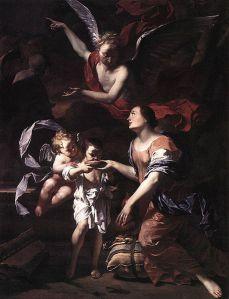
“Then God opened Hagar’s eyes, and she saw a well full of water. She quickly filled her water container and gave the boy a drink. (Genesis 21:19 NLT)
After Sarah witnesses Ishmael mocking her son Isaac, she tells her husband Abraham to cast out the bondwoman, Hagar, and her son. Abraham is distraught over the notion, after all, Ishmael is his son, too. Ishmael is about 17 years old when this event occurs, so he has lived in his father’s household a long time. Yet it has become apparent that there is no way for Ishmael and Isaac, not to mention their mothers, to live peacefully together in one household.
Genesis 21:14 tells us:
“Early in the morning Abraham got up, took bread and a waterskin, put them on Hagar’s shoulders, and sent her and the boy away. She left and wandered in the Wilderness of Beer-sheba.” (CSB)
Years earlier, Hagar had left Abraham’s house voluntarily after a dispute between her and Sarah (Genesis 16:6). She had fled from her mistress and encountered the Angel of the Lord at the well of Beer-lahai-roi. This time is different. This time she is banished from the home and sent away through no choice of her own. She and her son Ishmael are given a little bread and a skin of water and then sent away. God finds her once again, desperate and near a well of water. But unlike Beer-lahai-roi, Hagar does not see the well this time. She and Ishmael have reached the point of dehydration and she resolves herself to the idea that they will simply die of thirst in a barren land.
“Jesus answered and said to her, “If you knew the gift of God, and who it is who says to you, ‘Give Me a drink,’ you would have asked Him, and He would have given you living water.” (John 4:10)
This scene of Hagar and Ishmael in the desert is absolutely rich with spiritual imagery. It reminds us of a parallel instance where a desperate woman encountered God at a well; a Samaritan woman who came to draw water from Jacob’s well in John 4. This woman saw the well of water, but she didn’t see the Well of Living Water Who sat upon it. She, too, was”dying from thirst”, albeit a spiritual thirst that brought spiritual death. Like Hagar, the Samaritan woman’s eyes had to be opened to see the Well of life-giving water, a Well that was there all along.
“Jesus answered and said to her, “Everyone who drinks of this water will thirst again;but whoever drinks of the water that I will give him shall never thirst; but the water that I will give him will become in him a well of water springing up to eternal life.” (John 4:13-14)
Hagar and Ishmael carried with them into the barren desert a source of water of their own. But, alas, it was not enough. For our own sources of water shall always run empty and must be refilled. Like Hagar, the time comes when we are at the end of our own resources, when we must admit that we do not have any more on which to rely. In desperation we fall to the ground, waiting for the embrace of death to finally bring an end to our hopelessness. But we, too, lie next to a Well that we cannot see, dying of thirst when the Well of Living water is nigh unto us. And we will never see it until the Spirit of God opens our own eyes and leads us to it.
It is no coincidence, in my opinion, that Genesis 21 ends with the account of another well, a well of which Abraham has had taken from him (v. 25). We have seen the great need of Hagar and Ishmael, the poor outcasts, for the Well of Living Water. Now we see that Abraham, the wealthy and successful man, has just as great of a need for it. Rich, poor, man, woman, well-fed, hungry, confident, desperate: it makes no difference what condition we find ourselves in, our need for the Lord Jesus Christ is ever-present. Hagar could not live without the Well of Water, neither could Abraham. The Lord Jesus is ever-accessible to even the outcast and downtrodden, and He is ever-necessary for even the rich and mighty.
To Jesus Christ goes all glory. In service to Him,
Loren
[This post was originally published February 19, 2010]
[If you do not know the Lord Jesus Christ or you are not certain where you are headed when this life ends, I invite you to read the article “Am I Going To Heaven?“]
**Unless otherwise indicated, all Scripture quotations are taken from the New American Standard Bible (NASB) © The Lockman Foundation and are used by permission.
Scriptures marked (CSB) are taken from the Christian Standard Bible (CSB) Copyright © 2017 by Holman Bible Publishers. Used by permission. Christian Standard Bible®, and CSB® are federally registered trademarks of Holman Bible Publishers, all rights reserved.
Scriptures marked (NLT) are taken from the New Living Translation (NLT) Holy Bible, New Living Translation, copyright © 1996, 2004, 2007, 2013, 2015 by Tyndale House Foundation. Used by permission of Tyndale House Publishers Inc., Carol Stream, Illinois 60188. All rights reserved.
Scriptures marked (KJV) are taken from the King James Version of the Holy Bible, Public Domain.
Advertisements &b; &b;